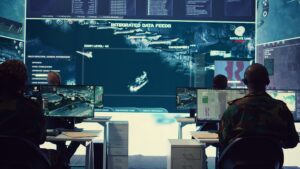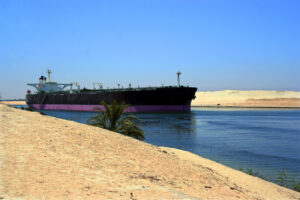Shipping was put on alert Monday over attacks against targets in port areas inside the wider Gulf region. Israel’s military launched airstrikes targeting ports and facilities in Yemen on Sunday, with the Iran-backed Houthis responding with ballistic missiles and drones targeting Israel’s two ports and one power station.
The Israel Defense Forces (IDF) said it struck three key ports – Hodeidah, Ras Isa, and Salif. An attack was then reportedly launched by the Houthis against Israel in exchange.
The attacks follow reports that a vessel (the Greek-owned Liberia-flagged bulk carrier Magic Seas) came under attack off Yemen after small boats fired self-propelled grenades towards the ship.
The incident occurred 51 nautical miles southwest of Al Hudaydah, Yemen, the United Kingdom Maritime Trade Operations (UKMTO) reported on Sunday.
The vessel was attacked by “multiple small vessels,” the report said. The vessels had opened fire, and a security team on the vessel had responded, with the incident continuing for hours.
“The vessel has been engaged by multiple small vessels who have opened fire with small arms and self-propelled grenades. Armed Security Team have returned fire and situation is ongoing,” UKMTO said.
In its latest report, the United Kingdom Maritime Trade Operations (UKMTO), which operates a voluntary reporting scheme (VRS) for the Indian Ocean, specifically Red Sea, Gulf of Aden, and Arabian Sea, advises vessels to exercise extreme caution in the vicinity of ports that have been subjected to previous strikes.
UKMTO says ship operators need to consider if ongoing navigation/operations in those areas are necessary.
“Despite the reduction in reported threat levels inside the wider Gulf region, vessels are reminded that there remains a high threat of collateral damage to vessels visiting Houthi controlled ports in the event of any further strikes against targets in these port areas,” UKMTO said in an advisory note on Friday.
UKMTO advised vessels to exercise extreme caution in the vicinity of ports that have been subjected to previous strikes, and to “consider carefully whether the risk of ongoing navigation/operations in those areas remains judicious.”
The regional threat level in the Middle East is assessed as significant, as specific areas still face threats.
Earlier this year, Israeli fighter jets struck a key Yemeni port on the Red Sea coast hitting dozens of Houthi targets and surrounding areas. Additionally, the status of the U.S. and Houthi ceasefire remains fragile following the U.S. attack on Iranian nuclear sites.
Washington is pushing now Iran to enter negotiations over the future of its nuclear programme. Both the US and Israel have declared that Iran cannot be allowed to develop nuclear weapons.
Following recent US and Israeli strikes, Iran has voted to suspend its co-operation with the International Atomic Energy Agency (IAEA).
In a joint statement released by the US State Department on July 1, the G7 foreign ministers of Canada, France, Germany, Italy, Japan, the United Kingdom and the United States of America and the High Representative of the European Union, call on Iran to urgently resume full cooperation with the International Atomic Energy Agency (IAEA) as required by its safeguards obligations and provide the IAEA with verifiable information about all nuclear material in Iran, including by providing access to IAEA inspectors.
Iran on Thursday has restated its commitment to the NPT and its Safeguards Agreement while rejecting Germany’s criticism over Iran’s decision to halt cooperation with the IAEA.
Iranian foreign minister Abbas Araghchi posted on X (formerly Twitter) that “in accordance with the new legislation by Majlis, sparked by the unlawful attacks against our nuclear facilities by Israel and the U.S., our cooperation with iaeaorg will be channeled through Iran’s Supreme National Security Council for obvious safety and security reasons.”
During a briefing on Wednesday, July 2, US State Department spokesperson Tammy Bruce said that Iran has an opportunity to pursue peace and warned its leadership against refusing to cooperate with the IAEA.
“First of all – and I want to get this correct here – it is – we’ll use the word “unacceptable” – that Iran chose to suspend cooperation with the IAEA at a time when it has a window of opportunity to reverse course and choose a path of peace and prosperity. Iran must cooperate fully without further delay,” Bruce said.
After Trump’s strategic strike on Iran’s nuclear facilities, the truce has temporarily halted a conflict that threatened to spiral into a regional war.
Despite chatter about diplomacy, a formal peace however between Israel and Iran remains far-fetched.
Bruce insisted that the US president is committed to ensuring that Iran “cannot and will not have a nuclear weapon.”
“It is worth repeating, as we’ve made tremendous strides to this through Donald’s Trump’s leadership: Iran cannot and will not have a nuclear weapon,” she said.
❗Operation ATALANTA confirms the successful coordination and facilitation of the rescue of the MV MAGIC SEAS crew following an attack in the Southern Red Sea.
— EUNAVFOR Operation ATALANTA (@EUNAVFOR) July 7, 2025
Operation ATALANTA is fully committed to maritime security in its Area of Operations.
More information ⤵️ pic.twitter.com/zE4fWy9aRD



